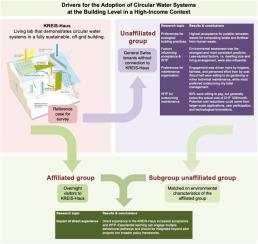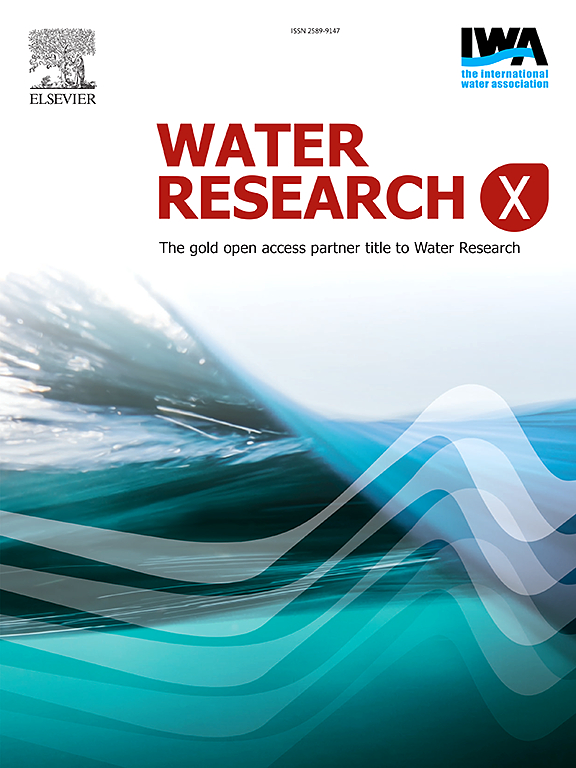Drivers for the adoption of circular water systems at the building level in a high-income context
IF 8.2
2区 环境科学与生态学
Q1 ENGINEERING, ENVIRONMENTAL
引用次数: 0
Abstract
Circular water systems at the building level offer potential for sustainable water management. Yet, user acceptance and willingness to pay (WTP) challenge their adoption. This study explores factors shaping acceptance and WTP by surveying 496 respondents on attitudes toward circular water systems and maintenance preferences. In addition, 76 visitors to the KREIS-Haus, a living lab in Switzerland, were surveyed to examine the influence of direct experience with circular water and building practices. Environmental awareness emerged as the most consistent predictor of acceptance of and WTP for circular water systems, while factors including living arrangement, environmental knowledge, dwelling size, and gender were significant in specific contexts. Among the circular practices presented, the use of treated rainwater as potable water, received the highest acceptance. Practices related to the nutrient cycle, such as composting toilets and producing fertiliser from human waste, were less accepted. About half of the respondents were open to participating in gardening (47 %) and minor technical maintenance (50 %), while preferring to outsource compost toilet management. Preferences were shaped by hygiene concerns, perceived effort, and fairness in task distribution. Visiting the KREIS-Haus increased acceptance and WTP, indicating a positive effect of experiential learning. These findings highlight the importance of combining behavioural, organisational, and contextual factors to enhance acceptance. Future research should explore the structure and long-term feasibility of maintenance models and whether stated acceptance leads to actual behavioural change.

高收入地区在建筑层面采用循环水系统的驱动因素
建筑层面的循环水系统为可持续水管理提供了潜力。然而,用户接受度和支付意愿(WTP)对它们的采用构成了挑战。本研究通过调查496名受访者对循环水系统和维护偏好的态度,探讨了影响接受度和WTP的因素。此外,76名参观瑞士生活实验室KREIS-Haus的游客接受了调查,以检查循环水和建筑实践的直接经验的影响。环境意识成为循环水系统接受度和WTP的最一致的预测因素,而包括居住安排、环境知识、住宅规模和性别在内的因素在特定环境中也很重要。在提出的循环实践中,使用处理过的雨水作为饮用水,获得了最高的接受度。与营养循环有关的做法,如堆肥厕所和从人类粪便中生产肥料,则不太被接受。大约一半的受访者愿意参与园艺(47%)和小型技术维护(50%),同时更愿意将堆肥厕所管理外包。偏好是由卫生考虑、感知努力和任务分配的公平性决定的。参观KREIS-Haus增加了接受度和WTP,表明体验式学习的积极作用。这些发现强调了结合行为、组织和环境因素来提高接受度的重要性。未来的研究应该探索维护模型的结构和长期可行性,以及声明的接受是否会导致实际的行为改变。
本文章由计算机程序翻译,如有差异,请以英文原文为准。
求助全文
约1分钟内获得全文
求助全文
来源期刊

Water Research X
Environmental Science-Water Science and Technology
CiteScore
12.30
自引率
1.30%
发文量
19
期刊介绍:
Water Research X is a sister journal of Water Research, which follows a Gold Open Access model. It focuses on publishing concise, letter-style research papers, visionary perspectives and editorials, as well as mini-reviews on emerging topics. The Journal invites contributions from researchers worldwide on various aspects of the science and technology related to the human impact on the water cycle, water quality, and its global management.
 求助内容:
求助内容: 应助结果提醒方式:
应助结果提醒方式:


